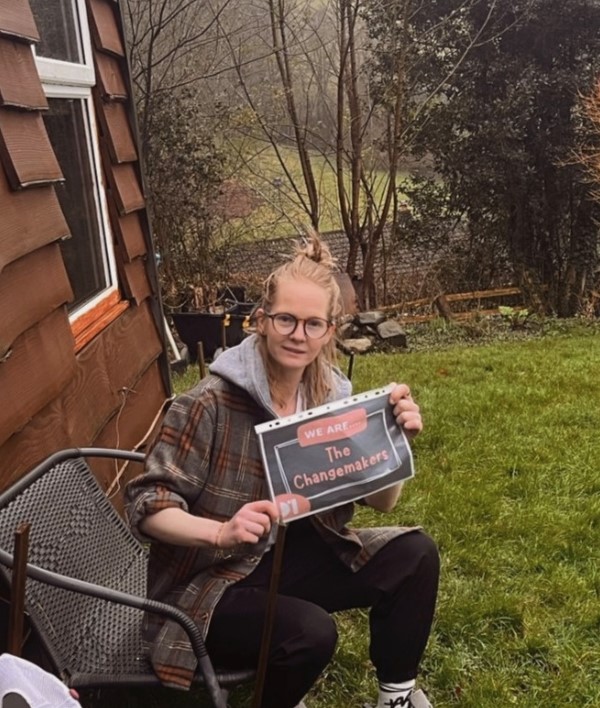On this Neurodiversity Celebration Week, guest blogger Cerys Rees shares her childhood experiences and how she is using it to influence positive change for young people.

Growing up, my acute awareness of being different fuelled a silent rebellion against a world tailored for neurotypicals. The constant hum of whispers from teachers, labelling me as disruptive, echoed shame and endless calls to my parents.
Diagnosed with complex learning difficulties, autism, dyslexia, and dyspraxia, and statemented at age four, my parents faced an uphill battle for my education, marked by frustration and obstacles. They had so many closed doors, professionals that told them I would never even be able to ride a bike. My dad made sure they were wrong, and I did manage to learn to ride a bike.
However, starting school would prove to be the start of another battle. Stepping into the confines of “room X” in secondary school amplified my isolation. The teacher sitting next to me in every classroom meant to assist, only intensified my feeling of defectiveness. My strengths in school were overlooked, and they sometimes punished me for being me.
Despite my parents’ unwavering determination, school overlooked my strengths, subjecting me to continuous punishment for merely being myself. Reaching year 9, teachers claimed I was too difficult for a traditional classroom, leaving my parents desperate to find a suitable school. Forced out of mainstream school, denial of access to education loomed, a fate shared by many young people today, had I not found a school designed for neurodivergent individuals.
The discovery of a special educational needs school in Somerset became my lifeline – a chance for an education tailored to my needs. The boarding school just outside Glastonbury was my only choice, far from the comforts of home in Wales. Though challenging, it offered what no other school did, they welcomed me.
At that school I worked hard, and I not only gained all my GCSEs but also continued to the Sixth Form, attended College, and earned a BTEC qualification in Health + Social Care and went on to work with adults with mental health difficulties before pursuing a degree in social sciences, community, and youth work. My journey, marked by adversity, led me to a career dedicated to changing an educational system that frequently excludes neurodivergent youth, eroding their confidence and, tragically, leading some to custody.
Understanding, not exclusion, is what young people need. There is a need for compassion, recognising that the fault is not always on them. Many professionals fail to reflect on how they might contribute to what they deem as ‘challenging’ behaviours. Exclusion from school reinforces our internal struggles, denying the chance to focus on strengths. Yet, despite the uphill battle, we persevere. We try harder, adapt more, and navigate a society that doesn’t always recognise the strength within neurodivergent individuals.
The education system, in its current form, isn’t designed for us. Every child deserves an education, and just because they learn differently, they shouldn’t be excluded. The system should adapt to diverse ways individuals learn, fostering an environment where strengths are celebrated, and differences embraced. I didn’t stand a chance in a mainstream school and why couldn’t I just be like my friends, why was I so different I used to wonder. I was never going to win against teachers that couldn’t see my behaviour was a reaction of the way I was being treated for simply just being me. How we perceive the world isn’t wrong. We shouldn’t be judged for not being able to sit still or shamed because we can’t spell a word a 7-year-old could or questioned because of the way do things.
Reflecting on my journey, I think of others facing similar struggles, lacking support, and enduring exclusion due to neurodivergence. The complex battle with local authorities further complicates the already challenging path to necessary support. My parents fought for my right to an education, revealing gaps in the system, and I carry that awareness into my work today. Working with young people I see that more than ever. I feel the frustration in their voice when all they want is to be heard. My voice has found strength, advocating for their right to support.
The world’s expectations weigh heavily on neurodivergent individuals. Sensory overload, daily anxiety, and the constant need to accommodate neurotypicals often go unnoticed. In a world claiming to understand autism, explanations are dismissed as excuses. We’re made to feel difficult, expected to conform, a distorted notion of equality.
It took years to embrace my neurodivergence. The constant effort to adapt to a world not built for us is exhausting, but it is a testament of who we are. Our neurodivergence viewpoints bring unique insights and strengths that deserve acknowledgment and celebration, not judgment or condescension. Embracing neurodivergence is not a weakness it’s a strength that society must learn to value and understand.
I’m not scared anymore to be who I am. I can’t mask myself to fit society’s mould. I’ve found strength that no amount of judgment or misunderstanding can diminish. I am not defined by the judgment in other eyes anymore but understand the strength it takes to face the world on my terms. And that is worth celebrating on this Neurodiversity Week.